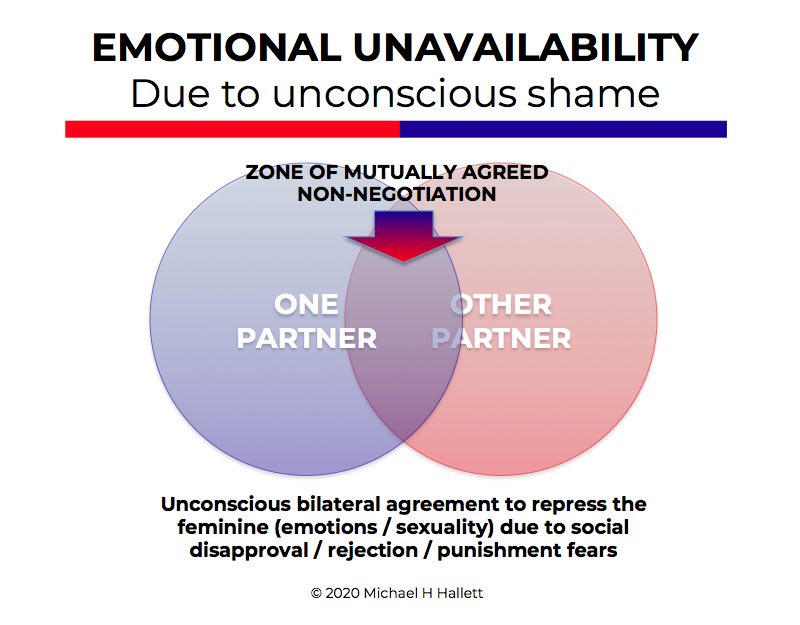What is emotional unavailability?
- 13 July 2020
- Posted by: Michael H Hallett
- Category: Cornerstones ,

I first began to write about emotional unavailability in the post Is there a hole at the heart of your relationship? In it, I wrote:
I’ve been having the same conversation over and over with people who are involved in personal development, building emotional integrity and improving the quality of their relationships: there is a hole at the heart of their most significant relationship, their marriage.
It’s the hole where we hide our truest selves from the one we love the most—because we’re afraid they would reject us if they saw what was inside.
So, what’s in this hole?
Our deepest and darkest emotional and sexual truths… the stuff we hardly dare think let alone speak. Things about our partner—or perhaps our in-laws—that trigger us but we never dare mention for fear of rocking the boat.
Emotional unavailability is a key component of what I call the Patriarchal Operating System, the acquisitive, consumptive and destructive psychological model that’s crippling humanity and the planet.
The Wall
Because both partners hide their deepest and darkest emotional and sexual truths from each other, the effect is to create an emotional dead zone at the heart of the relationship. It’s like a wall of invisible concrete between two lovers. That’s why I’ve used an image of a wall for this post.
Unavailability begins with each of us becoming walled off from our own feelings during childhood, a process perfectly documented in Pink Floyd’s rock opera The Wall (see Pink Floyd’s The Wall – a rock opera on sexual shame).
As long as both partners remain in emotional shutdown—as in Pink Floyd’s ‘Comfortably Numb’—neither is aware of this hole. Both partners believe their relationship is open and completely sharing in nature. That’s part of the lie that hides the hole. From what I can see, the majority of current relationships are, to some extent at least, like this.
Discovering emotional unavailability
The problems come when one partner undergoes emotional growth—some kind of emotional awakening—and comes into deep contact with their own feelings. When this happens a decade or two into a long-term relationship, this ‘waking from sleep’ sensation can be both bewildering and quite depressing.
I’ve spoken to a number of people about this. Although not (yet) a statistically valid sample, each experience is unique yet there are fairly uniform features.
For women, the experience of emotional unavailability is often a sense of their partner being absent. Their partner is present physically but not emotionally. The partner has no sense of this. It’s not that they don’t understand the issue; they honestly fail to grasp that an issue even exists.
For men, the experience of emotional unavailability is often the sense of being in a sexless or perfunctory, sexually suffocating relationship. Sex is infrequent, brief, lacking in variety or spice. The subject of sex is often off-limits.
Whether approached from a primarily emotional or primarily sexual angle, the underlying message is identical. It’s a sonar emission from the mother wound at the core of our being, drawing our attention to necessary deep healing work.
What is emotional unavailability?
The term ‘emotional unavailability’ refers to a person realising that their partner is entirely walled off with no desire for genuine emotional contact.
The term ‘emotional unavailability’ refers to a person realising that their partner is entirely walled off with no desire for genuine emotional contact.
This gives the disconcerting sense of being utterly alone at the heart of one’s key relationship.

Emotional unavailability arises from our patriarchal past that has systematically denied, denigrated, punished, suppressed and repressed the feminine aspects of being human. This creates a dead zone inside us that we can’t talk about. A friend of mine calls this the ‘zone of mutually agreed non-negotiation’.
The zone of mutually agreed non-negotiation is the place where partners encounter the most intimate aspects of each other—and avoid them.
The zone of mutually agreed non-negotiation
In Living with ghosts – confronting generational trauma I describe some of the skeletons in my family closet. These skeletons are socially shameful events that affected my parents and grandparents. I’m going to use two examples to show how the zone of mutually agreed non-negotiation works.
My grandfather abandoned my father when he was about 13. Shortly before she died, my mother told me that my father only mentioned his father once: he saw a Salvation Army band playing at Christmastime and blurted out, “Why aren’t they looking for my father?” (The Salvation Army used to look out for missing persons when they went fundraising in pubs.) So my father had a painful ‘dead zone’ within himself that he didn’t want to be reminded of.
My grandmother was ejected from the family in 1932 after she had an affair. My grandfather gained legal custody of my mother, who felt abandoned for the most shameful of reasons—sex. So my mother had her own ‘dead zone’.
The mechanics of the zone of mutually agreed non-negotiation dictated that my mother never engaged my father over his childhood wounds. Equally, my father never questioned my mother about hers. My grandfather’s air race trophy and war medals disappeared into a cupboard because they were too painful reminders of the affair and my mother’s subsequent abandonment.
The zone of mutually agreed non-negotiation functions through unconsciously sensing each other’s wounds then leaving them alone.
Fight, flight, freeze or fawn
What happens when one partner undergoes an emotional awakening?
We often cross that line without even realising it—and blunder into a minefield when we violate the zone of mutually agreed non-negotiation. We feel improved wellbeing from opening up emotionally. Blissfully unaware of the mechanics of emotional unavailability, we try to bring our partner along.
Violating your partner’s zone of non-negotiation, even gently, can trigger a sharp response. That’s because you’ve committed two crimes. Firstly, speaking about the unspeakable. And secondly, breaking the agreement to not speak about it.
Responses fall into the categories of fight, flight, freeze or fawn:
- Fight—confronting, blaming, shaming
- Flight—refusing to discuss the issue, storming out
- Freeze—not hearing, not responding, not understanding
- Fawn—making noises about increased emotional or sexual openness… but it never happens
These are all attempts to sweep the issue ‘under the carpet’ which is always a marker of unconscious shame.
Handling emotional unavailability
Once we realise we’re dealing with shame we have a framework for handling our partner’s emotional unavailability. People respond to shame in very predictable, mechanical ways. From this we can draw a shortlist of possible strategies:
- Leave the relationship
- Stay and try to ignore it
- Stay and try to ‘work on it’
- Accept your partner’s unavailability
Let’s look at each of these.
1. Leave the relationship
The nuclear option… Personally, I see this as the last resort—yet it may be the only resort. Remember that if you leave, you take with you whatever emotional unavailability you’re still carrying inside—and you’ll take that into your next relationship. Your current relationship provides a context for healing all your own emotional issues, regardless of what your partner does—see option (4).
2. Stay and try to ignore it
This is only ever a short-term strategy. Once you’ve undergone an emotional awakening and start violating your partner’s zone of non-negotiation, there’s no going back. You cannot go back to being an emotional zombie. The further you go down the path to emotional responsibility, the more you become aware of your partner’s unavailability—and the more it will irritate you.
3. Stay and try to ‘work on it’
Trying to get your partner to change, heal and experience emotional growth is a doomed strategy, for two reasons. Firstly, free will. Emotional growth is painful. We must make that choice for ourselves. We cannot demand that someone else changes, no matter how much we love them and want the relationship to continue.
Secondly, sovereignty. The purpose of emotional growth is to teach us emotional responsibility. To wave a magic wand, heal another and make them emotionally available is a violation of their sovereignty as a being. Part of taking emotional responsibility is not taking responsibility for the healing and growth of others.
4. Accept your partner’s unavailability
If leaving the relationship is the high road, this is the low road—the painful and unappreciated journey through a trackless waste in a perhaps quixotic attempt to evolve your relationship.
If you haven’t guessed it already, this is the path I recommend. Any gains you make here will benefit you, whether your relationship thrives/survives or not.
To achieve this, your acceptance must be total—the complete, unconditional acceptance of your partner, just as they are. Recognise that their unavailability is a reflection of their underlying damage, just as yours was. Recognise their right to change and grow in their own time—or not.
If you do this, two magical things happen. Firstly, you will emotionally evolve a great deal. Secondly, you create an emotional container, a safe space for your partner to grow without being negatively judged. This—and this alone—is the pathway out of emotional unavailability to emotional responsibility.
Emotional unavailability is tough on both partners. You must be willing to stare into the darkness to see the reality of the situation then be uncompromising in your willingness to make whatever life changes are necessary.
Releasing unconscious shame brings the clarity you need.
Photo by Henry & Co. on Unsplash
